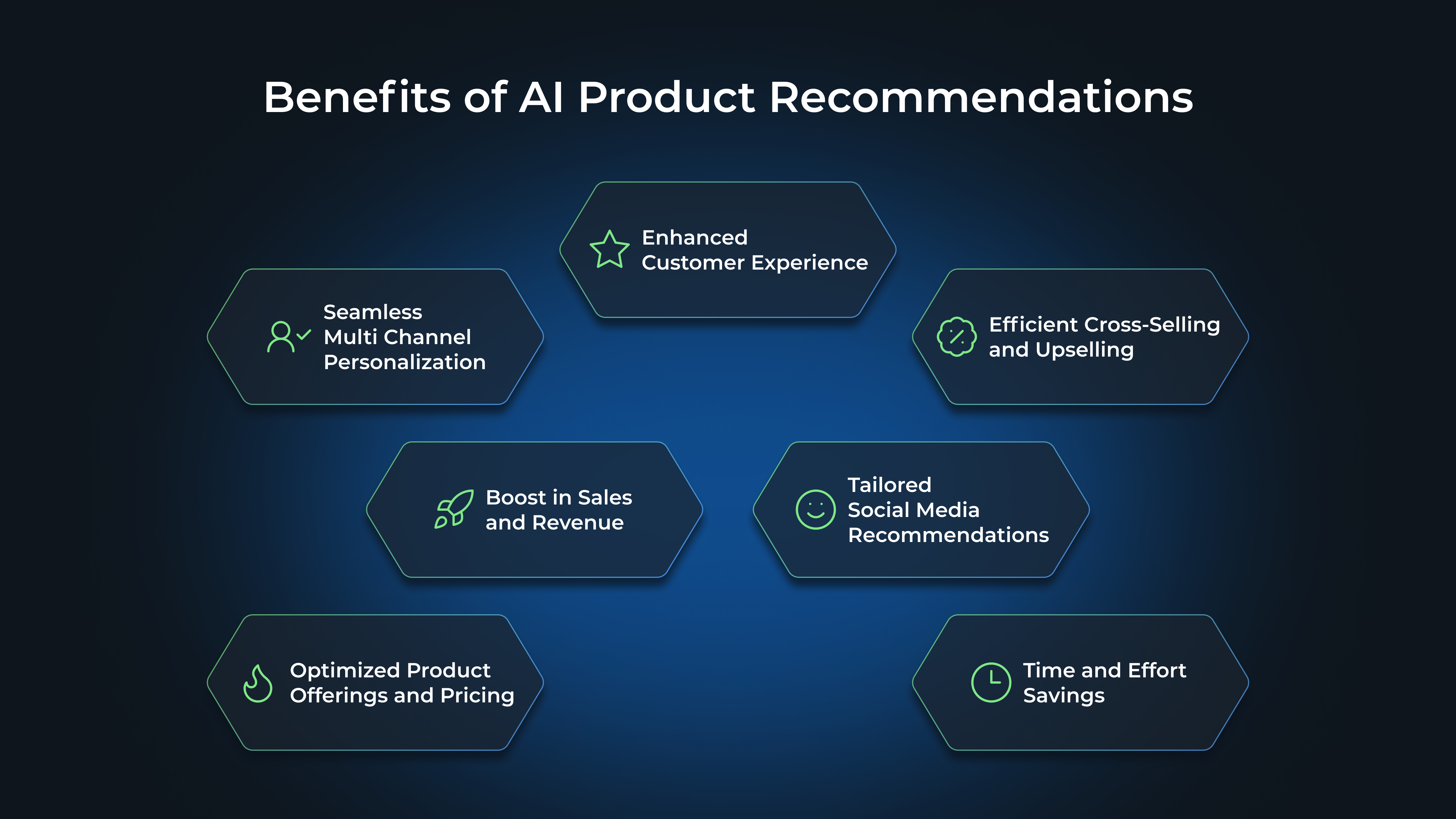We at WeSoftYou understand the importance of AI product recommendation for retail and e-commerce businesses. As technology continues to advance, it becomes crucial for companies to leverage AI to enhance their customer experience and boost their sales. In this article, we will explore the basics of AI in retail and e-commerce, delve into the mechanism behind AI product recommendations, discuss the benefits of implementing AI in your business, and explore future trends in this field.
How do AI Product Recommendations Work?

The Role of AI in Retail
Retail is a dynamic industry that requires businesses to constantly adapt to changing consumer demands. In today’s fast-paced world, customers expect personalized experiences and tailored recommendations. This is where Artificial Intelligence (AI) comes into play, revolutionizing the retail landscape.
AI has emerged as a transformative tool in the retail space, enabling retailers to analyze vast amounts of data and gain valuable insights into customer preferences and behaviors. By leveraging AI, retailers can better understand consumer demographics, shopping patterns, and buying behaviors. This information can then be utilized to deliver personalized product recommendations and targeted advertising, ultimately enhancing the overall shopping experience.
Imagine walking into a store where every product is handpicked just for you. AI makes this possible by analyzing your past purchases, browsing history, and even your social media interactions. It takes into account your unique preferences and suggests products that align perfectly with your taste. This level of personalization not only improves customer satisfaction but also increases the likelihood of making a purchase.
The Role of AI in E-commerce
AI plays a crucial role in the e-commerce landscape. With the rise of online shopping, businesses need to find innovative ways to engage customers and drive sales. This is where AI-powered product recommendations come into play.
By utilizing AI algorithms, e-commerce platforms can analyze customer browsing history, previous purchases, and even social media interactions to recommend products that align with their unique preferences. The algorithms take into account various factors such as price range, brand preferences, and even the latest trends to offer personalized recommendations that are highly relevant to each individual customer.
Imagine browsing an online store and being presented with a curated list of products that perfectly match your style and needs. AI makes this possible by understanding your preferences and suggesting items that you are most likely to be interested in. This level of personalization not only improves customer satisfaction but also encourages repeat purchases and fosters long-term customer loyalty.
Furthermore, AI can also help businesses optimize their inventory management. By analyzing customer data and predicting future demand, AI algorithms can assist retailers in making informed decisions about stock levels, ensuring that popular items are always in stock and reducing the risk of overstocking or understocking.
In conclusion, AI has become an indispensable tool in the retail industry, particularly in the realm of product recommendations. By harnessing the power of AI, retailers and e-commerce platforms can deliver personalized experiences, increase customer satisfaction, and drive revenue. As technology continues to advance, we can expect AI to play an even greater role in shaping the future of retail.
How does AI Analyze Consumer Behavior in Product Recommendation Systems?
AI product recommendation systems are built on sophisticated algorithms that analyze various aspects of consumer behavior. These algorithms take into account multiple data points, such as browsing history, purchase history, and click-through rates, to understand individual preferences and predict future buying decisions.
But how exactly does AI analyze consumer behavior? Let’s dive deeper into the mechanisms behind this fascinating technology.
Consumer Behavior
AI algorithms are designed to analyze consumer behavior from different angles. One of the key factors they consider is browsing history. By examining the websites and pages a consumer visits, AI can gain insights into their interests, preferences, and even their current needs.
For example, if a consumer has been searching for hiking boots and reading articles about outdoor activities, AI algorithms can infer that they are likely interested in outdoor gear. This information can then be used to recommend relevant products, such as camping equipment or hiking accessories.
Another important aspect of consumer behavior that AI algorithms analyze is purchase history. By examining the products a consumer has previously bought, AI can identify patterns and preferences. For instance, if a customer has a history of purchasing organic skincare products, AI can suggest similar items or even introduce new organic brands that the customer may not have discovered yet.
Click-through rates also play a significant role in AI analysis. By monitoring which products or recommendations consumers click on, AI algorithms can gauge their level of interest and adjust future recommendations accordingly. If a consumer consistently clicks on recommendations related to fitness equipment, AI can prioritize those types of recommendations in the future.
Learning and Adaptation
AI algorithms are not static; they continuously learn and adapt to changes in consumer behavior. This is made possible through machine learning techniques.
Machine learning allows AI algorithms to process vast amounts of data and identify patterns and trends. By analyzing historical data, AI can uncover valuable insights about consumer preferences and buying habits. These insights are then used to refine the recommendation process and make it more accurate over time.
For example, if a particular recommendation consistently leads to high conversion rates, AI algorithms will learn to prioritize similar recommendations in the future. On the other hand, if a recommendation consistently fails to resonate with consumers, AI algorithms will adjust their approach and explore alternative options.
Analytics and Personalization
Predictive analytics is a critical component of AI product recommendations. By using historical data and advanced statistical models, businesses can forecast future buying patterns and identify potential cross-selling or upselling opportunities.
For instance, if a customer has a history of purchasing books in a specific genre, AI algorithms can predict their future buying behavior and recommend new releases or related titles. This not only enhances the customer’s shopping experience but also increases the likelihood of them finding products that truly resonate with their interests.
Additionally, personalization is key to successful AI product recommendations. Tailoring recommendations to individual preferences and needs not only enhances the shopping experience but also increases the likelihood of customers finding products that truly resonate with them.
By analyzing various data points, such as demographic information, past purchases, and even social media activity, AI algorithms can create personalized recommendations that cater to each customer’s unique tastes and preferences.
For example, if a customer frequently posts about their love for cooking on social media, AI algorithms can take this into account and recommend kitchen gadgets or cookbooks that align with their passion.
In conclusion, AI product recommendation systems are powered by sophisticated algorithms that analyze consumer behavior from multiple angles. By leveraging machine learning techniques, these algorithms continuously learn and adapt to changes in consumer preferences, ensuring that the recommendations provided remain accurate and up-to-date. Predictive analytics and personalization further enhance the effectiveness of these systems, allowing businesses to forecast future buying patterns and tailor recommendations to individual preferences.
Benefits of AI Product Recommendations

Enhancing Customer Experience
One of the primary benefits of AI product recommendations is the improved customer experience it offers. By providing personalized and relevant recommendations, businesses can guide customers towards products that meet their specific needs, leading to greater satisfaction and engagement.
Imagine a scenario where a customer visits an online clothing store. With AI product recommendations, the system can analyze the customer’s browsing history, purchase history, and preferences to suggest items that align with their style, size, and color preferences. This level of personalization not only saves the customer time and effort but also enhances their overall shopping experience.
Moreover, AI enables businesses to deliver a seamless and personalized shopping experience across multiple channels, including websites, mobile apps, and social media platforms. For instance, a customer who frequently engages with a brand’s social media posts can receive tailored product recommendations directly within their social media feed, making the shopping experience even more convenient and enjoyable.
Boosting Sales and Revenue
From our experience, businesses that implement AI product recommendations often witness a significant boost in their sales and revenue. By presenting customers with products they are likely to be interested in, the chances of converting browsing into actual purchases increase substantially.
Let’s consider an online electronics retailer. With AI product recommendations, the system can analyze a customer’s browsing behavior, such as the categories they explore, the brands they prefer, and the price range they typically consider. Based on this information, the system can suggest related products that align with the customer’s preferences, increasing the likelihood of a purchase.
Furthermore, AI product recommendations have proven to be effective in generating cross-selling and upselling opportunities. By suggesting complementary products or higher-priced alternatives, businesses can increase their average order value and maximize their revenue. For example, a customer purchasing a camera may be recommended additional lenses, tripods, or camera bags, resulting in additional sales for the retailer.
In addition, AI can also help businesses identify trends and patterns in customer behavior, allowing them to optimize their product offerings and pricing strategies. By analyzing vast amounts of data, AI can uncover insights that human analysis may overlook, enabling businesses to make data-driven decisions that further enhance their sales and revenue.
AI Product Recommendations Implementation
Implementing AI product recommendations can greatly enhance your business by providing personalized and targeted suggestions to your customers. However, it is crucial to carefully consider various factors before diving into the implementation process. In this article, we will explore the key steps involved in implementing AI product recommendations and provide valuable insights to help you make informed decisions.
Choose the Right AI Tools
When it comes to implementing AI product recommendations, selecting the right tools and technologies is paramount. With the plethora of AI platforms and solutions available in the market, it can be overwhelming to make the right choice. At Wesoftyou, we understand the importance of aligning AI tools with your specific business needs. Our team of experts can assist you in evaluating the available options and selecting the most suitable solution for your business.
During the evaluation process, it is essential to consider factors such as the scalability, flexibility, and ease of integration of the AI tools. Additionally, assessing the accuracy and performance of the recommendation algorithms is crucial to ensure that the recommendations provided to your customers are relevant and effective.
Furthermore, it is important to consider the level of customization and control offered by the AI tools. Having the ability to fine-tune the recommendation algorithms based on your business requirements can significantly improve the overall customer experience.
Integrate AI into Your Existing Systems
Integrating AI product recommendations into your existing systems can be a complex process that requires careful planning and seamless integration. However, the benefits of implementing AI in your business outweigh the implementation challenges. At Wesoftyou, we have a proven track record in software development and can help you seamlessly integrate AI into your existing infrastructure.
Before integrating AI into your systems, it is important to conduct a thorough analysis of your existing infrastructure. This analysis will help identify any potential bottlenecks or compatibility issues that may arise during the integration process. By addressing these issues proactively, you can ensure a smooth and efficient integration of AI into your existing systems.
Additionally, it is crucial to consider the scalability and performance requirements of your systems. AI product recommendations can generate a significant amount of data, and your infrastructure should be capable of handling the increased workload. Our team of experts can assist you in optimizing your systems to ensure seamless integration and optimal performance.
Moreover, training and retraining the AI models periodically is essential to keep the recommendations up-to-date and relevant. Our team can help you establish a robust training pipeline that ensures the continuous improvement of your AI product recommendations.
In conclusion, implementing AI product recommendations in your business can provide a competitive edge by delivering personalized and targeted suggestions to your customers. By choosing the right AI tools and seamlessly integrating them into your existing systems, you can enhance the overall customer experience and drive business growth. At Wesoftyou, we have the expertise and experience to guide you through the implementation process and help you unlock the full potential of AI in your business.
Future Trends in AI Product Recommendations
Voice-Activated Shopping
Voice-activated shopping is an emerging trend that is set to revolutionize the way consumers interact with e-commerce platforms. By using voice assistants like Amazon Alexa or Google Assistant, customers can search for products and make purchases using just their voice commands. This technology opens up a whole new world of convenience and accessibility for consumers, allowing them to shop hands-free and without the need for a computer or mobile device.
Imagine being able to add items to your shopping cart or place an order simply by speaking to your virtual assistant. Whether you’re cooking in the kitchen, getting ready in the morning, or relaxing on the couch, voice-activated shopping provides a seamless and effortless shopping experience. With the advancements in natural language processing and voice recognition technology, voice assistants are becoming increasingly accurate and reliable, making it easier than ever for customers to find and purchase the products they need.
Businesses that leverage AI-powered voice assistants in their product recommendation systems have the potential to gain a competitive advantage in the market. By analyzing customer preferences, purchase history, and browsing behavior, these AI systems can make personalized recommendations tailored to each individual’s unique needs and preferences. This not only enhances the customer experience but also increases the likelihood of making a sale and building customer loyalty.
AI and Augmented Reality
Augmented Reality (AR) is another exciting area where AI can play a significant role in product recommendations. AR technology allows customers to virtually try on products and visualize how they would look before making a purchase. This immersive and interactive shopping experience bridges the gap between online and in-store shopping, providing customers with a realistic preview of the products they are interested in.
Imagine being able to see how a new pair of shoes would look on your feet or how a piece of furniture would fit in your living room, all without leaving the comfort of your home. With AI algorithms analyzing customer preferences and style choices, businesses can recommend personalized products based on shape, size, and style preferences. This not only helps customers make more informed purchasing decisions but also reduces the likelihood of returns and exchanges, saving both the customer and the business time and money.
As we can see, AI product recommendation systems have the potential to revolutionize the retail and e-commerce industry. The benefits of providing personalized recommendations to customers are evident in terms of improved customer experience and increased sales. By leveraging the power of AI, businesses can enhance their product recommendation systems, making them more accurate, efficient, and tailored to each individual customer.
At Wesoftyou, we specialize in software development, including AI solutions for retail and e-commerce businesses. Our team of experts is dedicated to helping businesses stay ahead of the curve by implementing cutting-edge technologies such as voice-activated shopping and AI-powered product recommendations. Contact us today for a free consultation or project estimation to explore how we can help you leverage AI product recommendations to drive your business forward.
FAQ
AI product recommendation is a technology that utilizes artificial intelligence algorithms to analyze consumer behavior and provide personalized product recommendations to customers. It helps businesses enhance the customer experience, boost sales, and drive revenue.
With AI product recommendation, businesses can tap into the power of machine learning to understand their customers better. By analyzing data such as browsing history, purchase history, and click-through rates, AI algorithms can identify patterns and make accurate predictions about what products a customer is likely to be interested in.
This technology has revolutionized the way businesses approach marketing and sales. Instead of bombarding customers with generic advertisements, AI product recommendation allows businesses to tailor their offerings to individual preferences, increasing the chances of making a sale and building customer loyalty.
AI analyzes consumer behavior by processing vast amounts of data. Through advanced algorithms and machine learning techniques, AI can make sense of this data and extract valuable insights.
When it comes to analyzing consumer behavior, AI looks at various factors. Browsing history is one of the key elements that AI algorithms take into account. By analyzing the websites a customer has visited, AI can gain insights into their interests and preferences.
Purchase history is another crucial aspect that AI considers. By analyzing what products a customer has bought in the past, AI can identify patterns and make predictions about future buying decisions. This information is invaluable for businesses looking to offer personalized product recommendations.
Click-through rates also play a role in AI’s analysis of consumer behavior. By examining which products or advertisements a customer has clicked on, AI can understand their level of interest and tailor recommendations accordingly.
The benefits of AI product recommendations are numerous and impactful. Firstly, AI product recommendations enhance the customer experience. By offering personalized recommendations, businesses can provide customers with a more tailored and relevant shopping experience. This leads to increased customer satisfaction and loyalty.
Secondly, AI product recommendations have a direct impact on sales and revenue. By suggesting products that customers are more likely to be interested in, businesses can increase the chances of making a sale. This not only boosts revenue but also maximizes the return on investment for marketing efforts.
Furthermore, AI product recommendations improve customer engagement. By providing customers with relevant recommendations, businesses can keep customers engaged and interested in their offerings. This leads to higher levels of customer interaction and a stronger brand-consumer relationship.
Lastly, AI product recommendations can help businesses stay ahead of the competition. By leveraging the power of AI, businesses can gain a competitive edge by offering a personalized and seamless shopping experience. This can differentiate them from competitors and attract more customers.
WeSoftYou is a software development company with a proven track record in building AI solutions for retail and e-commerce businesses. We have extensive experience in implementing AI product recommendations and can assist you every step of the way.
Our team of experts can help you choose the right AI tools and technologies that align with your business goals. We understand that every business is unique, and we tailor our solutions to meet your specific needs.
Once the AI tools are selected, we seamlessly integrate them into your existing systems, ensuring a smooth transition and minimal disruption to your operations. Our team of skilled developers and data scientists work closely with you to ensure that the implementation is successful and delivers the desired results.
Contact us today for a free consultation or project estimation to explore how we can help you leverage AI product recommendations to drive your business forward. We are committed to helping businesses like yours thrive in the digital age.






















